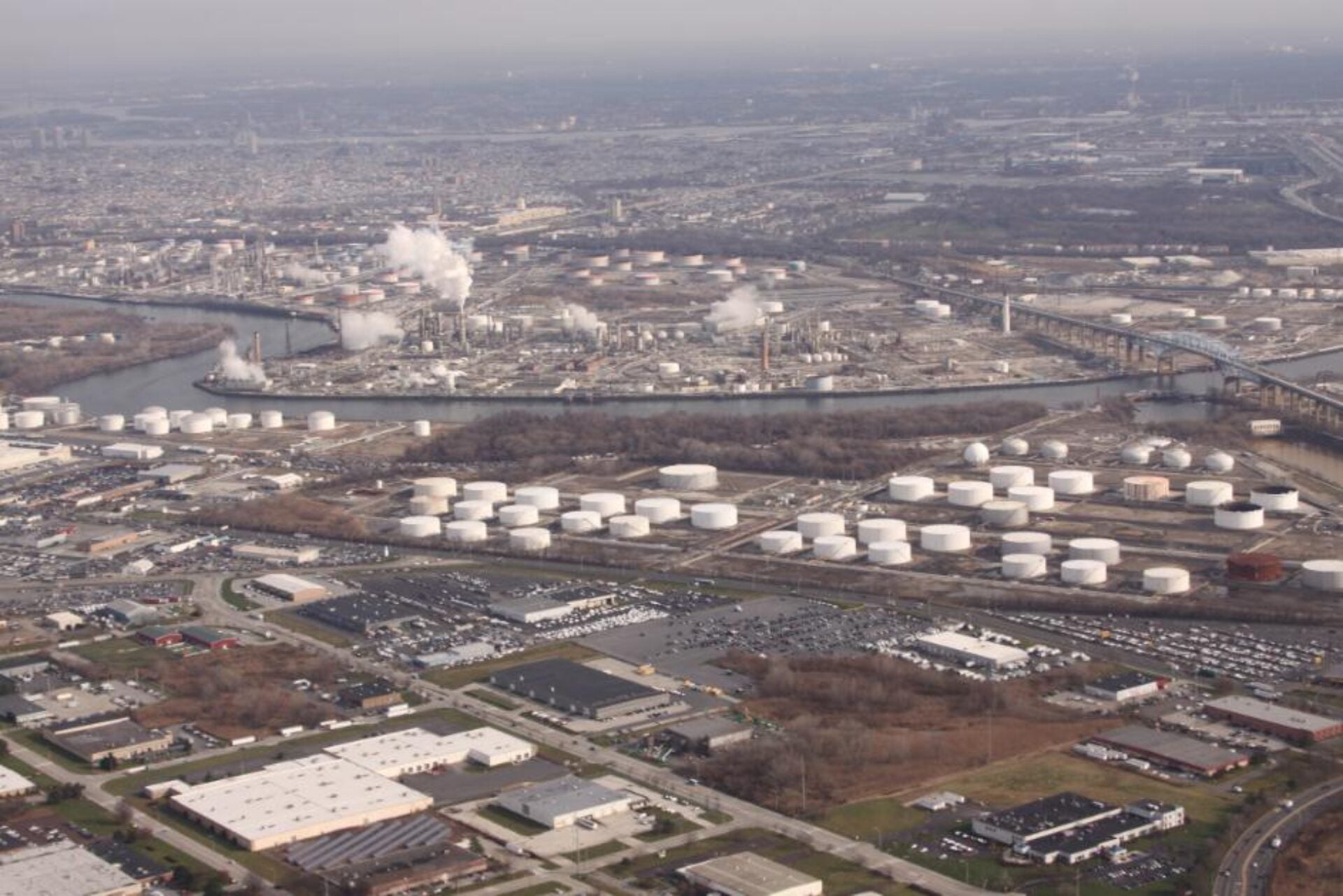
Does Trump Help or Hurt Philly’s Struggling Neighborhood Refinery?
I’ve been following the economic health of Philly’s neighborhood refinery, Philadelphia Energy Solutions (PES), for some time. In a June 2016 blog, I covered PES’ abandoned plans to go public due to lack of interest from “The Street”. In a November 9, 2016 post, I highlighted PES’ employee layoffs, information related to structured payments to Caryle Group investors that were dragging down company financials, and brainstormed about redevelopment opportunities at the sprawling (but highly contaminated) urban site.
Well, a lot has happened since my last blog, with many implications for the financially struggling PES.
On November 10, Moody’s downgraded PES Refining and Marketing corporate family rating from B1 to B3, probability of default rating dropped from B1-PD to B3-PD (meaning more likely to default), and downgraded ratings on certain loans from B1 to B3, with the overall outlook dropping from stable to negative (Note: Movement from non-investment grade B1 to B3 status indicates a trend from a highly speculative investment towards substantial investment risk). Moody’s cited high leverage, weak refining margins predicted for 2017, high cost renewable fuel credits, maturation of debt in April 2018, and other factors as contributing to the downgrade, but mentioned PES’s experienced management team as an asset.
That experienced management team has been led by Phil Rinaldi, who love him or not, has an accomplished background and track record in the refining business. However, in February 2017, Rinaldi announced his plans to retire, passing along the reins to a less experienced protégé. Is the timing a coincidence? I suspect not.
However, perhaps the biggest change has been the new U.S. President, Donald Trump. But, does the Trump presidency hurt or help PES?
PES has long complained about high cost renewable fuel credits dragging down the company. Carl Icahn, billionaire investor and majority owner of the CRV Energy refinery, has been tapped as a special regulatory advisor to President Trump and has been advocating for changes to the renewable fuel standard program. These rule changes could be triggered through executive order, but would require standard proposal and comment period (and likely litigation) before taking place. So, in the medium term, maybe the future is looking brighter?
On the other hand, there is the Dakota Access pipeline, a controversial project from Energy Transfer Partners (parent company of Sunoco, and therefore part owner of PES) that was put on hold by the Obama Administration, but permitted to move forward under President Trump.
Access to cheap domestic crude from shale oil plays, like North Dakota’s Bakken formation, has been part of PES’ strategy as an independent refiner that could tap multiple feedstock sources in an effort to secure the most attractive margin. However, oil shale economics got crushed (and many shale oil producers went bankrupt) when OPEC allowed production gluts in an effort to squeeze out new market suppliers (like the U.S. shales). This meant PES (and others) lost access to cheap domestic crude and had to switch focus to imports, mostly from places like Africa and South America.
Well, now OPEC is cutting production and the U.S. shales are coming back, lean and mean. But, Dakota Access – which will connect the Bakken shale oil supply to existing pipeline infrastructure in Illinois in order to move the supply to the Mid-West and Gulf Coast (possibly for export, as the Gulf refineries are less suited for light sweet crude processing) – may serve to reduce shale oil availability to East Coast refineries. In general, Dakota Access will make U.S. shale oil more available and cheaper to Mid-West and Gulf markets, and less available and more expensive to East Coast refineries still reliant on costly rail transport. In this case, PES’ reliance on imports can be expected to continue.
In comes President Trump’s plans for a Border Tax Adjustment on imports. In general, this 20% tax on imports would make exporting crude oil more attractive and importing oil less attractive. East Coast refineries could be hurt because they are more reliant on imports. (On the other hand, no one knows how other countries will retaliate to the border tax adjustment and/or how changes to dollar valuation will impact overall economics.)
SEC filings from Sunoco’s partner company, Energy Transfer Partners, shows significant losses (-$76 million in adjusted EBITDA) at PES for 2016.
Other East Coast refineries are also feeling the heat. Delta Air Lines, owner of the Monroe Energy refinery just south of Philly, reportedly just hired a consultant firm to help assess options for the money-losing refinery.
In the immediate term, oil supplies are high and gasoline inventory is low, creating a generally more attractive environment for refiners. But how long will it last?
Dakota Access will likely reduce domestic supply availability to PES, a clear negative. Longer term, will potential changes to the renewable fuels standard program be enough to combat potentially higher import prices? No one knows for sure, but it is certainly easier to change regulations than it is for Congress to pass comprehensive tax reform.
One thing is certain, the future remains very unclear for PES.
Christina Simeone
Kleinman Center Senior FellowChristina Simeone is a senior fellow at the Kleinman Center for Energy Policy and a doctoral student in advanced energy systems at the Colorado School of Mines and the National Renewable Energy Laboratory, a joint program.

